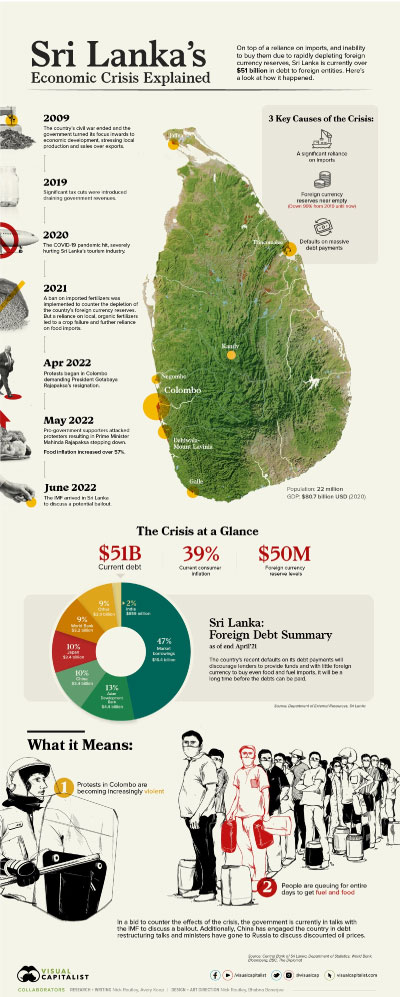Friday Feb 20, 2026
Friday Feb 20, 2026
Friday, 7 June 2024 02:27 - - {{hitsCtrl.values.hits}}
 Several people on social media now comment negatively about how the current President handled the 2022 political and economic crisis. None of them can deny that we were in a dire economic and political crisis, and we desperately looked to the world for relief to meet even our basic needs. Without India’s and others help, Sri Lanka would have certainly become another Lebanon.
Several people on social media now comment negatively about how the current President handled the 2022 political and economic crisis. None of them can deny that we were in a dire economic and political crisis, and we desperately looked to the world for relief to meet even our basic needs. Without India’s and others help, Sri Lanka would have certainly become another Lebanon.
Several countries around the world are still struggling to come out of their crisis. Many young people ran away in hordes from the country, anticipating a run on several fronts, the biggest among them a banking run. The heavy burden heaped on the population as a result of mismanagement and corruption is inescapable and cannot be heaped on the President. Those responsible must be held accountable. The bankruptcy that was declared without proper consideration virtually brought our economy to a grinding halt. Forex reserves were down to a few thousands. Somebody had to restart it? Gotabaya Rajapaksa looked to Ranil Wickremesinghe. He rose up to the challenge. That is what the President has done in the last 15 months. He has provided steady and consistent leadership through a historic reset of Sri Lanka.
The challenging upheaval of the Aragalaya and the outbreak of international conflicts have all impacted Sri Lanka. Mistakes were made, such as pushing lending rates by over 100% and declaring bankruptcy. Some of them were decisions of the former President. Going to the IMF for relief was the last resort. Some people now even claim we have mortgaged our future to the IMF and given up our sovereignty. With the IMF deal there are bitter pills to swallow. We could have been more sensible in the negotiations.
However, people’s sovereignty is protected when the rule of law is respected. When politicians instigate the public to suit their narrow political goals, it is certainly not a triumph for people’s sovereignty or democracy. It is misguided patriotism. What we need is a vision for our country that is not second to any in the region, that is intellectually rigorous, accessible, internationally engaged, innovative and efficient to enable all Sri Lankans to be part of a productive society with a broader economic and industrial base. That is what educated young people like us want from our leaders.
 What lies ahead
What lies ahead
As a country, Sri Lanka would have to prepare for further downside risks in 2025 with the growing debt problems and, the growth problems in Europe and the slowdown in Asia. Slower growth is already visible in weakening global trade and commodity prices. The key to improving our market competitiveness lies in raising our country’s capabilities; that is, to make appropriate investments in education through higher education and professional training to be more efficient in generating and managing new technologies. Young people in our country want jobs. Lessons learned from other successful countries in attracting FDI indicate that the ability to create a skilled human resource base is crucial for multinational companies to relocate firms and for world-class high-tech plants to enter new markets.
In Sri Lanka, unfortunately, the education system in the country is not delivering the volume and quality desired, and to make things difficult, we are losing our trained talent to other developed markets. The areas of growth for the Lankan economy in the future would be the services sector. Therefore, it is the knowledge and training of the people that would finally matter to move us beyond our current bankruptcy. Therefore, we need leaders who understand this opportunity as a country irrespective of party colour. They must come together for a common purpose because politics has to be about service.
Presidential election
The late John F. Kennedy described politics as a “noble adventure, an adventure in which one joins hands with the masses for the service of man”. Not that the Kennedys didn’t play “politricks” in their heyday. But playing “politricks” with a nation’s well-being and her people’s vulnerable mindset is an unforgivable sin. Sri Lanka’s Presidential election, scheduled for October 2024, looks set to defy many predictions and be a true competition, as the surveys suggest. As such, the polls threaten risks and promises to the entire community. For the country in general, there is an opportunity for long-term economic stability and reconciliation.
The country certainly wants and needs capable leadership that can provide a vision for the country in which everyone could see themselves involved in its final recovery. Most mainstream parties unlike in the past must not play to the Sinhala Heartland, fuelling and fermenting further the disappointment, frustration, resentment and anger in Tamil and Muslim communities. Restructuring Sri Lanka’s debt, particularly with significant creditors such as India and China, still remains to be concluded.
Sri Lanka’s strategic importance to China and India is growing, particularly concerning its trade and infrastructure connectivity in the Indian Ocean region under the Belt and Road Initiative. This entails navigating a delicate path between satisfying international creditors, balancing geopolitical interests between India and China, and implementing inclusive economic policies to reduce poverty and stimulate growth. Therefore, to steer the country through all this, we need a leader with competence, compassion, principles and resolve, young people no longer believe their values or interests carry the respect of those in Parliament.
(The writer teaches accounting and finance at a UK university.)